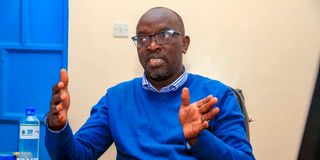Giving children in Kibera a chance at quality education

What you need to know:
- I was going to work early one morning when I encountered a school girl who was crying hysterically and appeared desperate.
- Later that week, I attended a church service whose message was on service to others.
- That stuck with me and I decided to support the child by taking her to an elderly woman who takes care of orphans.
David Kitavi, 49, is the founder of Ushirika School in Kibera. He quit his job in IT in the year 2000 to start the school, which offers primary, secondary and college education
Tell us about yourself…
My name is David Kitavi, the founder and director of Youth Development Forum (YDF), a community based organisation in Kibera. YDF runs a number of projects including Ushirika School that runs from Baby Class all the way to college.
Could you take us to the beginning of this initiative?
I was going to work early one morning when I encountered a school girl who was crying hysterically and appeared desperate. Later that week, I attended a church service whose message was on service to others. That stuck with me and I decided to support the child by taking her to an elderly woman who takes care of orphans. I later came to learn that the child had been beaten and chased away from home by feuding parents.
After supporting the child, I realised that there were many social problems in Kibera community, so I took it upon myself to address them. I rallied my friends and that is how Ushirika School began.
How old were you?
At that time, I was 25 years old, done with college and working in IT. Actually, I had just started my first job.
Interesting...how did your parents react to this?
They were very angry with me. They couldn’t understand how I could go to school against the backdrop of financial challenges, get a job that was paying reasonably well, then talk of quitting to start a children's centre in Kibera. They thought that I had run mad.
Why were you so keen on education?
I was born and bred in Kibera, and I saw education as my ticket from the slums. There are many issues affecting children in Kibera such as alcoholism, absent parents and poverty. I realised that if you give education to a child, you empower them academically and they stand a better chance of having a better future. Later, they can contribute in positively impacting their communities. This is why I chose to empower children using education.
When you say education challenges, what do you mean?
At that time, unlike now, many parents were not enrolling their children to school. They were locked out by registration fees and other costs tied to this such as purchase of stationery and uniform. Many of the parents were also unemployed. Ushirika offered the children a chance to learn, get free meals in school and also uniforms.
What are some of the challenges you faced while on this pursuit?
We didn’t know how to approach potential funders, we didn’t know how to write good proposals and were very weak in networking with potential partners. At the school, there was no running water and we lacked adequate toilet facilities. It was a very tough time because we really desired to have a child friendly environment. Thankfully, we were able to fundraise and do more than we imagined. We started witnessing better performance in children and with better infrastructure, learning is now taking place without any interruptions.
That must have come with lessons….
One of them, and perhaps the greatest so far, is on local fundraising. Sometime back, with some of my colleagues, we attended a training by Change the Game Academy in partnership with Kenya Community Development Fund and learnt the techniques of raising money from the members of the community and local organisations.
The other is on structures. When we started, parents were not required to pay school fees or buy uniforms. In 2003, when free education was introduced in Kenya, most of them moved their children to public schools until they realised that they were overcrowded and wanted to come back. This is when we introduced some structures such as school fees which is Sh1, 000 every month. Every Saturday, we train parents on possible business ventures and often support them with capital. This way, they are able to pay the fees whether in cash or in kind.
At one point, you joined politics…
Oh, yes. I had never thought of myself as a politician but the people around me, my parents and other members of Laini Saba in Kibera, persuaded me to run for the position of Member of County Assembly in 2013. Although they overwhelmingly voted me in, I was unhappy in that role. After the first term, I came back to this, where my heart belongs.
What keeps you going?
We have children who pass through our hands and they later come back to support the centre. Presently, we have three students in university and are fundraising to support other needy children. When I see alumni of Ushirika School go to college and get meaningful employment or start their businesses, it gives me hope. Also, their great performance in national exams and co-curricular activities greatly motivates me.
[email protected]





